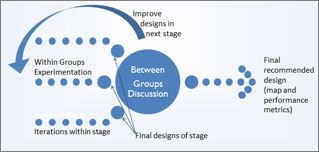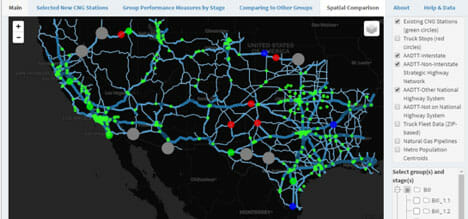
Featured project
COLLABLOCATION: Geodesign Workshops for CNG Refueling
Sponsors
Arizona Board of Regents
Research Innovation Fund
Challenge
Compressed natural gas is an abundant, low-cost, domestic fuel that shows promise for use in long-distance trucking to improve air quality and reduce greenhouse gas emissions. A successful transition to CNG (or other alternative fuel) trucking requires a coordinated rollout of fuel production and retailing.
It is challenging, however, to integrate different types of stakeholders from different regions into an effective solution to identify the location of refueling stations. To address this, a team led by ASU’s School of Geographical Sciences and Urban Planning developed COLLABLOCATION.
Summary
COLLABLOCATION (a Collaborative Laboratory for Location) is a free, open-source collaborative geodesign methodology for use by industry stakeholders in a workshop setting to experiment and negotiate the location of compressed natural gas fuel stations in the U.S. Southwest.
The online mapping tool allows users to:
- Display a general base map with zooming capability.
- Visualize multiple spatial data layers of importance to planning fuel stations.
- Add/relocate/remove facilities with a simple point and click.
- Compute the performance of the selected stations working.
- Assess and compare performance across groups and across stages of the workshop.
- Iterate and improve previous designs.

Results
A pilot COLLABLOCATION workshop was held in June 2017 with the support from Valley of the Sun Clean Cities Coalition. Stakeholders from five states participated, including several Clean Cities Coordinators and representatives of natural gas utilities, fuel companies, truck manufacturers, universities, cities and state agencies that oversee utility companies.
At the end of three stages of network design, consensus high-priority locations chosen by multiple groups began to emerge (see gray dots in image below).
